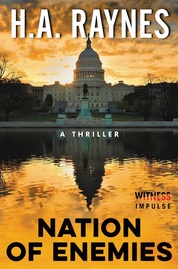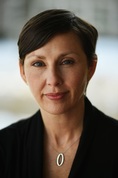|
I'm always interested in the process of world-building. While world-building is important for any story, I think that it is even more critical when writers are creating an unfamiliar world for their readers. So, for example, my books are set in 17th century England, during the time of the plague and the Great Fire of London (check out my countdown to the right!!!). While many people know about the Tudor England or the Regency period, the 1660s are a far less familiar period. So, I spend a lot of time thinking about larger cultural, social, political and gender trends that helped define my world, as well as norms, conventions and features of the period. But I think world-building is also important for those setting their books in the future, by nature an undefined period. So I invited author H.A. Raynes onto my blog today to talk about how she went about conceiving and building the future for her debut novel, NATION OF ENEMIES.  Nation of Enemies is set in the near future world of 2032 in the United States. People ask me why that year, in particular, and how did I go about creating that future world? First, the choice to set the story in 2032. Integral to the plot is a presidential election, so that was key in determining the year. Next, and importantly, I wanted it to be near enough that we can almost feel it...imagine it. It’s in our lifetime, depending on our age. I didn’t want to get caught up in the technological advances which would put Nation of Enemies more in the sci-fi realm, which would make it a different book entirely. And so then came the research. In this world I built, the United States is war-torn, like any war-torn country, wrecked by attacks, non-functioning in many ways. People have left the cities, which are easy targets, and fled either to the countryside or else attempt to emigrate to safer shores. They’re less concerned with technology and comfort and more concerned about the safety of their families. As the economy fails, government spending goes toward fighting the war and maintaining hospitals that are on the front line. A doctor is one of my protagonists and for his point of view, I researched the future of medicine. Genetics, equipment, medicine. How a hospital might function with advances in these areas. I interviewed a friend who is a doctor and used the internet at length. Of course, there’s reality and predictions of what will be in the future. I combined those elements with my imagination. I also combined them with the politics of war when I introduced the legislation of the MedID biochip citizens are forced to wear in 2032. There is an actual biochip in use today, though it is quite simple in comparison to my MedID and how it’s been manipulated by the U.S. government. There’s freedom in creating a future world. I also considered schools - what would happen if schools became even more of a target than they are today? (Though just this week, several schools in my state of Massachusetts had bomb threats.) Knowing that parents are vulnerable, I imagined terrorists using schools to, well, terrorize society on a whole new, emotional level. That forced me to bring all schools online in 2032. Kids attend class virtually, creating a safer but less social educational experience. But children suffer in this way, locked in their bedroom away from friends and situations that foster personal growth. Finally, I researched the future of the internet, the language used by experts in the field, and the hackers who exist in a darker but very real realm. It was both fascinating and frightening to discover the skills of these hackers and how they challenge governments and corporations on a daily basis for their own agendas. To “futurize” my novel, though I used terminology hackers currently use along with society’s (and government’s) fears about their power, I simply ushered them down the path. As firewalls and encryptions become more sophisticated, so do hackers. Already we are experiencing hacks into financial institutions and government agencies - I found it easy to imagine an even more widespread problem, especially when the country is distracted by war. I don’t want to spoil any plot points in Nation of Enemies, but recently there was an aspect of the Paris Attacks that included an element I used (researched and pushed farther) in terrorist communications. It sent a chill up my spine. My near-future world of 2032 is not one in which I want to live. I’m a hopeful, positive person and I have great hopes for the futures of my children. Sadly, it wasn’t difficult and in fact was quite plausible to imagine the darker side of humanity emerging with the state of the world we live in today. Let’s hope my imagination does not win out. Doesn't this book sound great?! Here's the official blurb: 2032. Turned away by London Immigration because of his family’s inferior DNA, Dr. Cole Fitzgerald returns to work at Boston’s Mass General hospital. He purchases ballistics skins for family, a bulletproof car and a house in a Safe District. As the War at Home escalates, Cole begins an underground revolution to restore civil liberties and wipe away the inequity of biology. Along the way he’ll risk his family, his career and his life when he discovers the U.S. government may pose a greater threat than the terrorists themselves.  H.A. Raynes was inspired to write NATION OF ENEMIES by a family member who was a Titanic survivor and another who escaped Poland in World War II. Combining lessons from the past with a healthy fear of the modern landscape, this novel was born. A longtime member of Boston’s writing community, she was a finalist in the Massachusetts Screenwriting Competition and has published a short story in the online magazine REDIVIDER. H.A. Raynes has a history of trying anything once (acting, diving out of a plane, white water rafting, and parenting). Writing and raising children seem to have stuck.
4 Comments
1/21/2016 06:16:33 pm
I love the way you wove together a kernel from the past with a futuristic scenario, Holly!
Reply
1/21/2016 06:37:57 pm
This is great! Fascinating, and I also love taking "facts" and then spinning the "what if."
Reply
Leave a Reply. |
Susanna CalkinsHistorian. Mystery writer. Researcher. Teacher. Occasional blogger. Categories
All
Archives
May 2023
|
 RSS Feed
RSS Feed